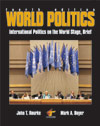Russia has fallen suddenly and precipitously on hard times. Its stunned population is frustrated and restive over the external collapse of Moscow's former power and prestige and the internal collapse of Russia's economy and many of its social structures. It cannot be said for sure that the frustrations that Russians have experienced since the collapse of the Soviet Union will lead to domestic oppression and international belligerence. Yet the parallels with Germany in the 1920s and early 1930s are unsettling, and Russia's travails are fertile ground for a more oppressive domestic policy and a more aggressive foreign policy. Taking advantage of Russia's woes, as Hitler did in Germany, some Russian politicians tell the people that Mother Russia has been reduced to its current status by internal and external conspirators and offer radical solutions as the way back to prosperity and global respect. Demagogues from both the left and right attack President Boris Yeltsin for surrendering too meekly to the West's expansion of NATO and other policies and for generally allowing Russia to fall to the ranks of a second or even third rate power. Gennady Zyuganov, who heads the Russian parliament's largest party and who finished second to Boris Yeltsin in the 1996 presidential election, is one of those who is willing to engage in demagoguery to advance his political fortunes. One internal problem, according to Zyuganov, is the "ever more perceptible influence of Judaic dispersal" throughout history. This, he says, created in Russia and Europe a Jewish class "which traditionally controlled the financial life of the continent" and was the "bearer of the controlling packet of shares in the complete industrial-economic system of Western civilization.1 The external threat, Zyuganov warns Russians, stems from a U.S.-led "geopolitical sabotage" designed to subvert Russia in a plot to "establish the West's global supremacy."2 Zyuganov has pledged that if he gains power he will work "to restore the might of the Russian state," to follow "the foreign policies of pre-revolutionary [czarist] Russia," and "to restore [Russia's] unique role as the pivot and fulcrum of a Eurasian continental bloc." As for the now-independent former Soviet republics, Zyuganov has promised to seek "a restoration of the former Soviet people... as a historical necessity dictated by Russia's needs."3 Polls shows that Russians are subject to such blandishments. Democracy is not secure. The internal bedevilments, imagined or real, have created strong pressures inside Russia to seek order. When asked whether "order or democracy" was "more important for Russia now," Russians chose order over democracy by a ratio of almost 9 to 1.4 Russians are also prone to believe that they are being subverted by the United States and its allies. One poll found that 60 percent of those Russians interviewed agreed with the statement, "The West is pursuing the goal of weakening Russia."5 President Yeltsin clearly feels the nationalist pressure and, to some degree, has tried to fend it off by being more nationalist himself. During the presidential campaign, he named Yevgeny Primakov, a veteran of Soviet diplomacy as foreign minister. Setting the tone for his tenure, Primakov declared during this first press conference that "Russia was and remains a great power. Her foreign policy should correspond to that status."6 Yeltsin has threatened to intervene in the former Soviet republics (FSRs),which Russians now refer to as "the near abroad" (blizhneye zarubezhye). Yeltsin is also more apt to make statements like, "Russia's economic, political, and humanitarian interests extend to the entire [once] Soviet space (Dawisha, 1997:79) This drift had been of sufficient concern to prompt President Clinton to worry aloud that that nationalist pressures on Yeltsin could cause Russia to attempt "the reimposition of some sort of empire."7 It would be a hyperbole to attribute the nationalist drift in Yeltsin's foreign policy entirely to pressure from his internal opposition. It is also too early to tell what Russia's future holds. It is likely, however, that nationalist pressure will continue to influence Russian policy. The communist-dominated parliament, the Duma, is relatively weak compared to the president and cannot directly dictate foreign policy. Nevertheless, explains Russian analyst Igor Klyamkin, it "can foster an imperialistic mood here and further isolate Russia from its neighbors and the West."8 Notes 1. Quoted in Adrian Karatnycky, "The Real Zyuganov," op-ed piece in the New York Times, March 5, 1996, p. A23. 2. Time, May 27, 1996, p. 55. 3. Gennadi A. Zyuganov, "Junior Partner? No Way," an op-ed piece in the New York Times, February 1, 1996, p. A21. 4. Time, May 27, 1996, p. 51. 5. New York Times, April 19, 1996, p. A2. 6. New York Times, January 12, 1996, p. A3. 7. New York Times, March 15, 1994, p. A1. 8. New York Times, December 19, 1995, p. A1. |



 2002 McGraw-Hill Higher Education
2002 McGraw-Hill Higher Education